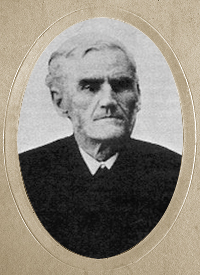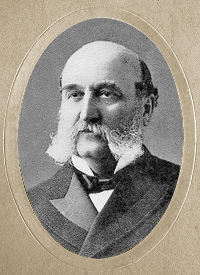Hiding in Thee
BIBLE REFERENCE:
The LORD also will be a refuge for the oppressed, a refuge in times of trouble.
Psalms 9:9
In the fear of the LORD is strong confidence: and his children shall have a place of refuge.
Proverbs 14:26
Thou art my hiding place; thou shalt preserve me from trouble; thou shalt compass me about
with songs of deliverance. Selah.
Psalms 32:7
But the LORD is my defence; and my God is the rock of my refuge.
Psalms 94:22
Thou art my hiding place and my shield: I hope in thy word.
Psalms 119:114
The LORD preserveth all them that love him: but all the wicked will he destroy.
Psalms 145:20
William O. Cushing - Lyrics
1823-1902
Born: December 31, 1823, Hingham Center, Massachusetts.
Died: October 19, 1902, Lisbon Center, New York.
Buried: Jones Cemetery, near Searsburg, New York.
Ira David Sankey - Composer
1840-1908
Born: August 28, 1840, Edinburg, Pennsylvania.
Died: August 13, 1908, Brooklyn, New York.
Buried: Green-Wood Cemetery, Brooklyn, New York.
HYMN HISTORY:
William O. Cushing was for more than twenty years a successful pastor in the eastern area of the United States. Following the death of his wife in 1870, ill health forced his retirement from the active ministry.
During this time he became intensely interested in hymn writing and wrote more than three hundred hymns, cooperating with such gospel musicians as Ira Sankey, Robert Lowry, George Root, and others.
Mr Cushing has left the following account regarding the writing of “Hiding in Thee”:
“Hiding in Thee” was written at Moravia, New York, in 1876. It must be said of this hymn that it was the outgrowth of many tears, many heart conflicts,
and yearnings of which the world can know nothing. The history of many battles is behind it. But the occasion which gave it being was the call of Mr. Sankey, He said, “Send me something new to help me in my gospel work.” A call from such a
source, and for such a purpose, seemed to be a call from God. I so regarded it and prayed, “Lord, give me something that may glorify Thee;” It was while thus waiting the “Hiding in Thee” pressed to make itself known. Mr Sankey called forth the tune,
and by his genius gave the hymn wings, making it useful in the Maser’s work.
William C. Cushing is also the author of “Ring the Bells of Heaven” and “When He Cometh.”
Ira D. Sankey is often called the “father of the gospel song” because he made extensive use of this new type of music in his evangelistic campaigns with D. L. Moody, and he worked hard in widely publishing and distributing gospel songbook collections.
One collection alone Sacred Songs and Solos, is said to have sold more the eighty million copies in the first fifty years following its initial publication. This book is still being published and used today. This collection,
as well as a series of publications in which Sankey collaborated with P. P. Bliss and George C. Stebbins, Gospel Hymns Numbers 1-6, has had an extraordinary influence on evangelical church music to the present time.
Although the singing of the Psalms, hymns, and spiritual songs had always been an important part of public worship since the time of the sixteenth century Protestant Reformation, Sankey introduced a style of congregational singing that was
“calculated to awaken the careless, to melt the hardened, and to guide the inquiring souls to Jesus Christ.”
It was frequently said that Sankey was as effective a preacher of the gospel of salvation with his songs as his associate, D .L. Moody, was with his sermons.
For nearly thirty years Sankey and Moody were inseparable in the work of the gospel, both in the United States and throughout Great Britian. Sankey's smooth, cultured ways complemented and made up for Moody’s poor English and impulsiveness.
They were often referred to as the “David and Jonathan of the gospel ministry.”
Ira Sankey had little or no professional voice training. He generally accompanied himself on a small reed organ, singing simply but with careful enunciation and much feeling and expression. His voice was described as an exceptionally strong baritone
of moderate compass. An English newspaper once wrote the following review:
As a vocalist, Mr Sankey has not many equals. Possessed of a voice of great volume and richness, he expresses with exquisite skill and pathos the gospel message,
in words very simply but replete with love and tenderness, and always with marked effect on the audience. It is , however, altogether a mistake to suppose that the blessing which attends Mr. Sankey’s efforts is attributed only or chiefly to his fine voice and artistic expression.
Another writer wrote as follows regarding Sankey’s manner of singing:
There was something about his baritone voice that was enormously affecting. He had a way of pausing between lines of the song, and in that pause the vast audience remained silent.
“Hiding in Thee” first appeared in a collection entitled Welcome Tidings, compiled by Robert Lowry, William H. Doane, and Ira Sankey in 1877.It was preface with the Scriptural text “My strong rock for a house of defense.”
Dear Brothers and Sisters in Christ,
In God is my salvation and my glory: the rock of my strength, and my refuge, is in God.
Psalms 62:7
The God of my rock; in him will I trust: he is my shield, and the horn of my salvation, my high tower, and my refuge, my saviour; thou savest me from violence.
2 Samuel 22:3
The main theme of the hymn "Hiding in Thee" is that God is the Rock of our salvation and in Him we can find refuge. There has been many days when we personally have been buffeted and abused by this world's system,
we longed to return home to find comfort and a safe place. The same should be true of us as Christians, that we long for the fellowship of our Lord Jesus Christ and desire to be with Him.
The word refuge used in
2 Samuel 22:3
may be translated "mansion," or "abiding- place," which gives the thought that God is our abode, our home. There is a fullness and sweetness in these promises, for dear to our hearts is our home.
It is at home that we feel safe: we shut the world out and dwell in quiet security. When we are in complete fellowship with our God we "fear no evil." He is our shelter and retreat, our abiding refuge.
At home, we take our rest; it is there we find comfort after the fatigue and toil of the day.
In the same way our hearts find rest in God when wearied with life's conflicts, we turn to Him, and our soul dwells at ease.
At home, also, we let our hearts loose; we are not afraid of being misunderstood, nor of our words being misconstrued. So when we are with God we can commune freely with Him, laying open all our hidden desires; for if the "
secret of the Lord is with them that fear Him
,"
(Psalms 25:14)
the secrets of them that fear Him ought to be, and must be, with their Lord.
Home, too, is the place of our truest and purest happiness: and it is in God that our hearts find their deepest delight. We have joy in Him which far surpasses all other joy. It is also for home that we work and labour.
The thought of it gives strength to bear the daily burden, and quickens the fingers to perform the task; and in this sense we may also say that God is our home. Love to Him strengthens us. We think of Him in the person of His dear Son;
and a glimpse of the suffering face of the Redeemer constrains us to labour in His cause. We feel that we must work, for we have brethren yet to be saved, and we have our Father's heart to make glad by bringing home His wandering sons.
Happy are those who have the Lord their God as their refuge!
A Hymn and its History is a ministry that depends solely upon the Lord for his guidance.
Please help us to continue to touch lives and bring blessings to many others
24 hours a day all over the world. If you have been blessed by
this Ministry please give a donation as the Lord lays it upon
your heart, and share in the Blessings. By investing
in the lives of others you will reap benefits that
will last for all eternity.
|
_______________________________________________________________________________________________
_______________________________________________________________________________________________
_______________________________________________________________________________________________
_______________________________________________________________________________________________
_______________________________________________________________________________________________




